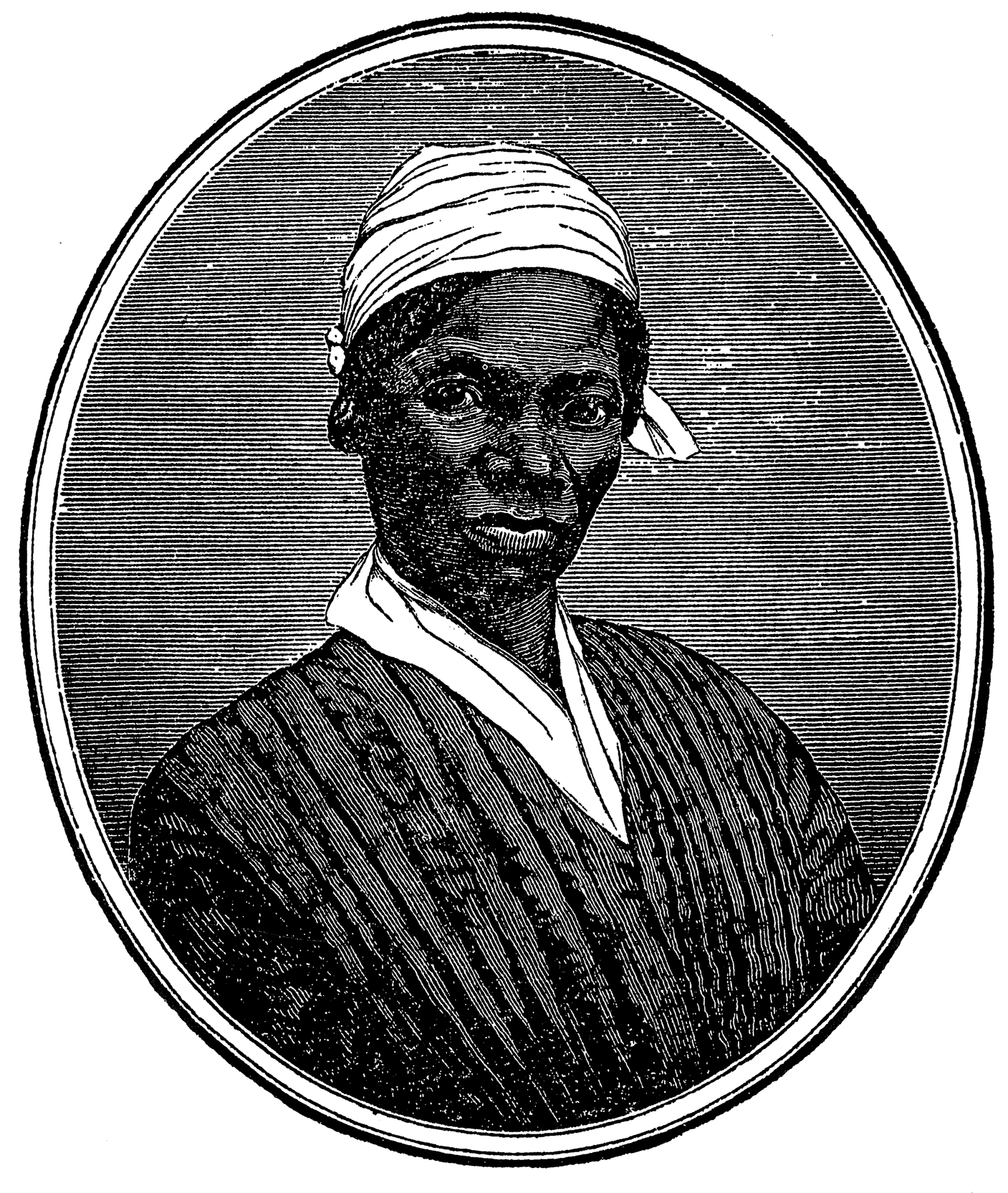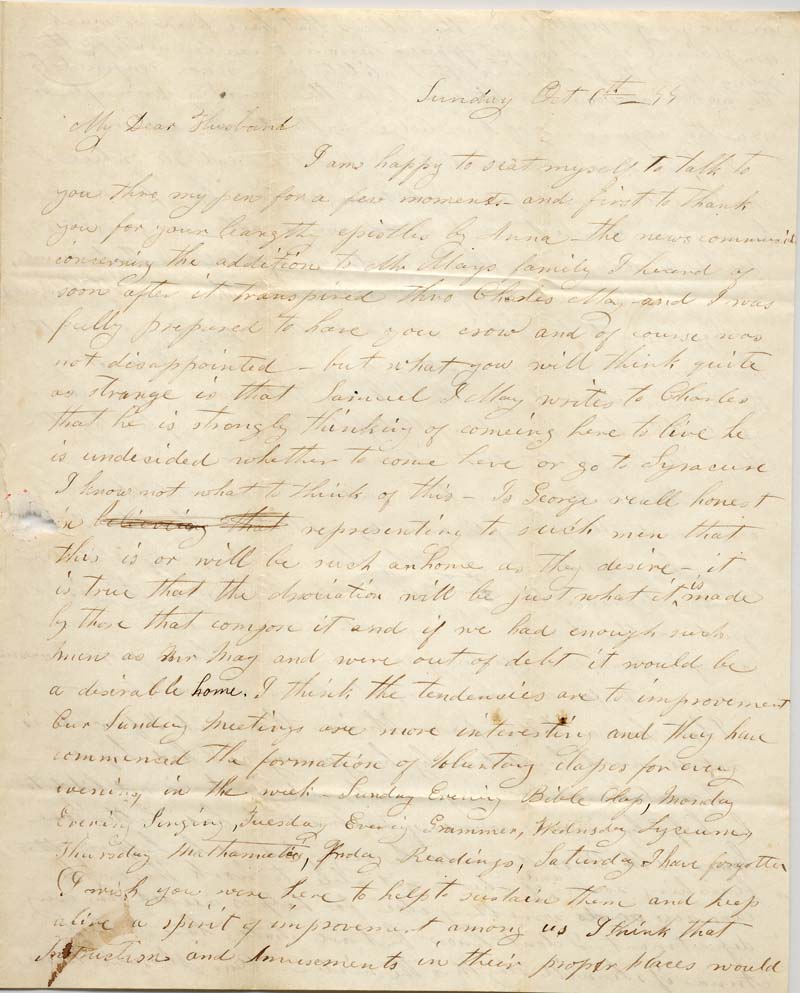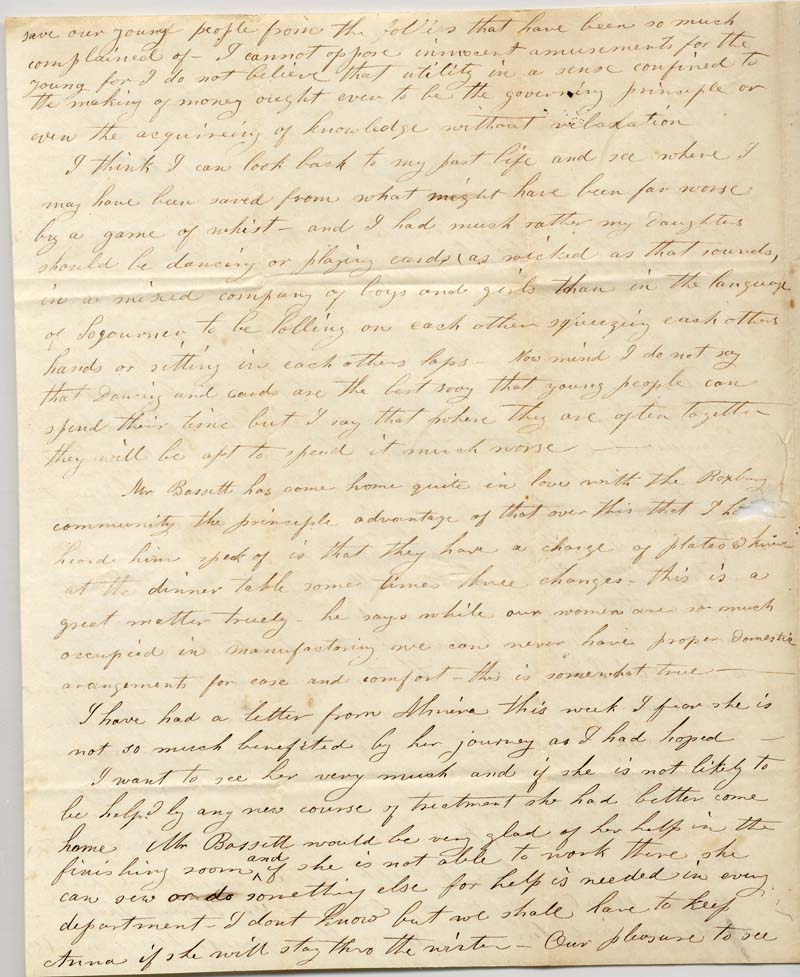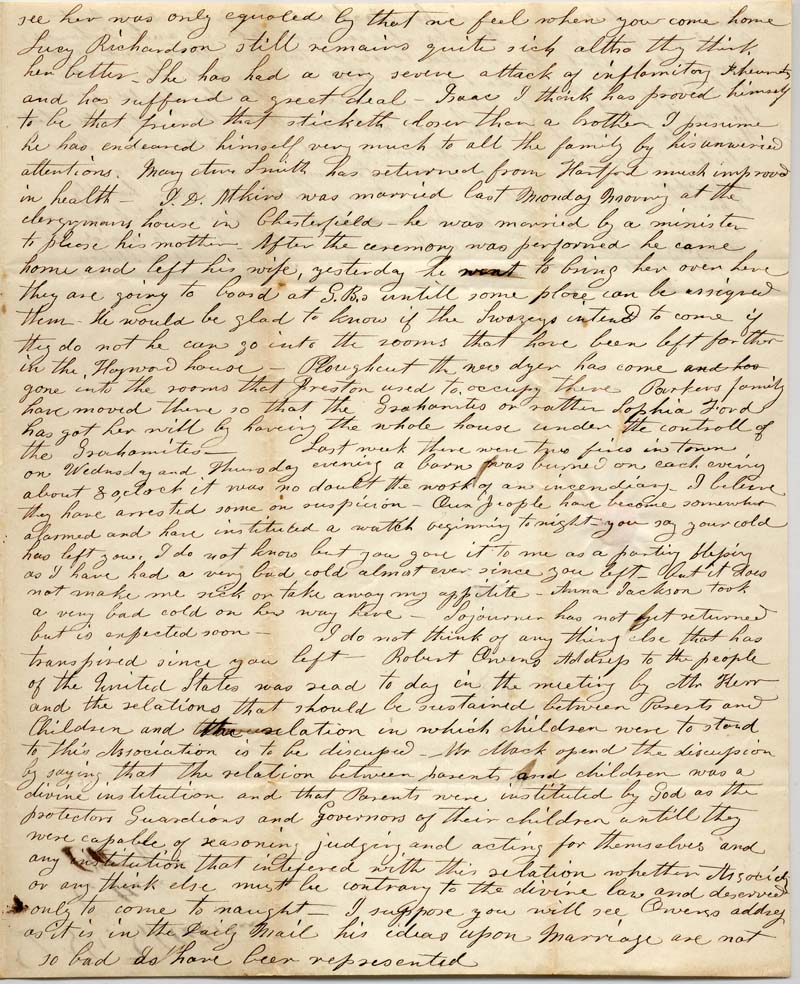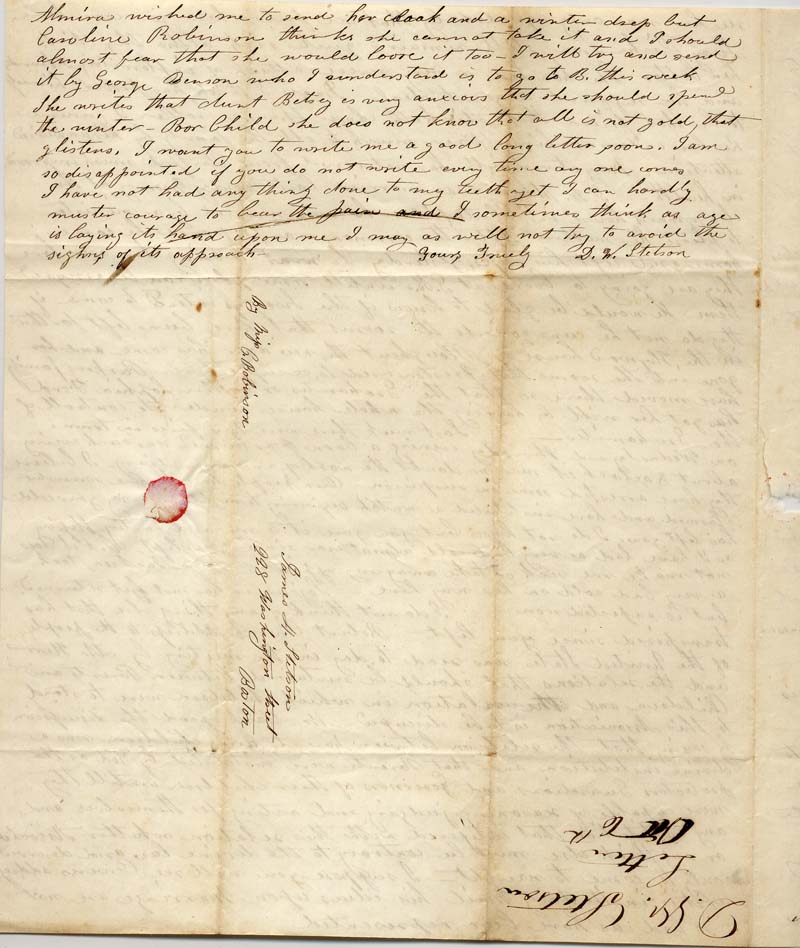Transcript:
[Oct 6, 1844]
Sunday Oct 6th __44
My Dear Husband
I am happy to seat myself to talk to you thro my pen for a few moments – and first to thank you for your leangthy epistles by Anna – the news commuctd. concerning the addition to Mr Mays family I heard of soon after it transpired thro Charles May and I was fully prepared to have you crow and of course was not disappointed – but what you will think quite as strange is that Samuel J May writes to Charles that he is strongly thinking of comeing here to live he is undecided whether to come here or go to Syracuse I know not what to think of this – Is George reall honest in believing that representing to such men that this is or will be such an home as they desire – it is true that the Association will be just what it is made by those that compose it and if we had enough such men as Mr May and were out of debt it would be a desirable home.1 I think the tendencies are to improvement Our Sunday meetings are more interesting and they have commenced the formation of Voluntary classes for every evening in the week – Sunday Evening Bible Class, Monday Evening Singing, Tuesday Evening Grammer, Wednsday Lyceum, Thursday Mathamatics, Frday Readings, Saturday I have forgotten I wish you were here to help to sustain them and keep alive a spirit of improvement among us I think that Instruction and Amusements in their proper places would save our young people from the follies that have been so much complained of – I cannot oppose innocent amusements for the young for I do not believe that utility in a sense confined to the making of money ought ever to be the governing principle or even the acquireing of knowledge without relaxation
I think I can look back to my past life and see where I may have been saved from what might have been far worse by a game of whist – and I had much rather my daughters should be dancing or playing cards (as wicked as that sounds, in a mixed company of boys and girls than in the language of Sojourner to be lolling on each other squeezing each others hands or sitting in each others laps – Now mind I do not say that Dancing and cards are the best way that young people can spend their time but I say that where they are often together they will be apt to spend it much worse —
Mr Bassett has come home quite in love with the Roxbury community2 the principle advantage of that over this that I ha[ve] heard him speak of is that they have a change of plates & knive[s] at the dinner table some times three changes – this is a great matter truely – he says while our women are so much occupied in manufactoring we can never have proper domestic arangements for ease and comfort – this is somewhat true —
I have had a letter from Almira this week I fear she is not so much benefited by her journey as I had hoped –
I want to see her very much and if she is not likely to be helpd by any new course of treatment she had better come home Mr Bassett would be very glad of her help in the finishing room and if she is not able to work there, she can sew or do something else for help is needed in every department – I dont know but we shall have to keep Anna if she will stay thro the winter3 – Our pleasure to see see her was only equaled by that we feel when you come home
Lucy Richardson still remains quite sick altho they think her better – She has had a very severe attack of inflamitory rheumatz and has suffered a great deal – Isaac I think has proved himself to be that friend that sticketh closer than a brother – I presume he has endeared himself very much to all the family by his unweried attentions. Mary Ann Smith has returned from Hartford much improved in health – J. D. Atkins was married last Monday Morning at the clergymans house in Chesterfield – he was married by a minister to please his mother – After the ceremony was performed he came home and left his wife, yesterday he went to bring her over here they are going to board at G.B.s untill some place can be assigned them4 – He would be glad to know if the Swazeys intend to come if they do not he can go into the rooms that have been left for them in the Hayward house – Ploughcut5 the new dyer has come and has gone into the rooms that Preston used to occupy there Parkers family have moved there so that the Grahamites or rather Sophia Ford has got her will by haveing the whole house under the controll of the Grahamites6 — Last week there were two fires in town on Wednsday and Thursday evening a barn was burned on each evening about 8 o,clock it was no doubt the work of an incendiary – I believe they have arrested some on suspicion – Our people have become somewhat alarmed and have instituted a watch beginning tonight – you say your cold has left you. I do not know but you gave it to me as a parting blessing as I have had a very bad cold almost ever since you left – but it does not make me sick or take away my appitite – Anna Jackson took a very bad cold on her way here – Sojourner has not yet returned but is expected soon — I do not think of any thing else that has transpired since you left – Robert Owens Address to the people of the United States was read to day in the meeting by Mr Kerr and the relations that should be sustained between Parents and Children and the relation in which children were to stand to this Association is to be discussed – Mr Mack opend the discussion by saying that the relation between parents and children was a divine institution and that Parents were instituted by God as the protectors Guardians and Governors of their children untill they were capable of reasoning judging and acting for themselves and any institution that intefered with this relation whether Associat[ion] or any think else must be contrary to the divine law and deserved only to come to naught – I suppose you will see Owens address as it is in the Daily Mail his ideas upon Marriage are not so bad as have been represented7
Almira wished me to send her cloak and a winter dress but Caroline Robinson thinks she cannot take it and I should almost fear that she would loose it too – I will try and send it by George Benson who I understand is to go to B. this week8 She writes that Aunt Betsey is very anxious that she should spend the winter – Poor Child she does not know that all is not gold that glistens. I want you to write me a good long letter soon. I am so disappointed if you do not write every time any one comes I have not had any thing done to my teeth yet I can hardly muster courage to bear the pain and I sometimes think as age is laying its hand upon me I may as well not try to avoid the sighns of its approach –
Yours Truely D.W. Stetson
Addressed: James A. Stetson / 228 Washington Street / Boston // By Miss C. Robinson
Notes
- In September 1844 George W. Benson had sought a meeting with Samuel J. May, to propose that May should come to the NAEI and run the community’s Education Department. From this letter, it appears that May considered the suggestion seriously, but by December word had arrived that he was inclining towards a move to Syracuse, N.Y., and Benson wrote again to persuade him to opt for the NAEI instead (George W. Benson to Samuel J. May, September 26, 1844, Boston Public Library, MS. A.1.2.14.59, and December 23, 1844, MS. A.1.2.14.82). In the event May became the Unitarian minister in Syracuse, where he would remain until his death in 1871.
- Brook Farm.
- Anna Jackson.
- James D. Atkins and Octavia Damon were married on September 30, 1844 and boarded at George W. Benson’s until a room was found for them.
- “Ploughcut” was a silk dyer named L. H. Plouquet or Ploucquet who seems to have been hired to work during the winter of 1844-5. Letters from S. L. Hill to R. M. Niles, January 27 and February 13, 1845 refer to batches of silk sent by Niles from Hartford to be dyed at the NAEI (NAEI Records, vol. 4, pp. [83, 92-93] ). Plouquet apparently developed a dye using bark to add weight to the silk, but when this proved to add insufficient weight to a batch, he proposed “a new and superior dye,” which “will use … sumac which he considers more sure in adding weight.” See also note 43, above.
- Sophia Foord, the Parkers and others were followers of Sylvester Graham (1794-1851), noted writer and lecturer on health and dietary reform, who lived in Northampton and who occasionally lectured at the NAEI. Graham advocated temperance, sexual restraint (including in marriage), avoidance of meat and refined flour, a diet based on vegetables, fruit, and coarse bread flour (“Graham flour”), regular exercise, frequent bathing, well-ventilated rooms, and sleeping on hard wooden beds, to avoid the dangers of sensuality posed by feather mattresses. See Stephen Nissenbaum, Sex, Diet, and Debility in Jacksonian America: Sylvester Graham and Health Reform (1980).
- The Welsh-born social and educational reformer Robert Owen (1771-1858) founded or inspired a number of cooperative communities in the British Isles and the United States between the 1820s and the 1840s, of which that at New Harmony, Indiana, from 1825 to 1827 was the best known. Owen’s condemnation of the conventional connections between property, marriage, and religion had outraged members of orthodox American churches in the 1820s and gained him, at their hands, a lasting reputation as an infidel. When he revisited the United States in the mid-1840s, Owen took steps to explain his opinions; his article, “Address of Robert Owen to the People of the United States,” originally published in the New York Daily Tribune on September 24, 1844, restated his views on marriage, which Dolly Stetson evidently found quite reasonable. See Robert Owen, “Address of Robert Owen to the People of the United States,” in John R. Commons, et. al., ed., Documentary History of American Industrial Society, 11 vols. (Cleveland, Ohio, 1910-11): VII, 155-160.
- Boston.

